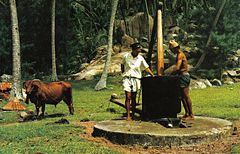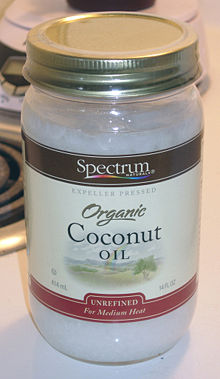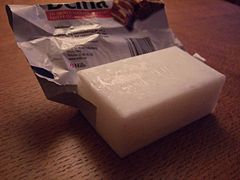Coconut oil
2008/9 Schools Wikipedia Selection. Related subjects: Food

Coconut oil, also known as coconut butter, is a tropical oil with many applications. It is extracted from copra (derived from the word "kopra" which means dried coconut). Coconut oil constitutes seven percent of the total export income of the Philippines, the world's largest exporter of the product.
Coconut oil was developed as a commercial product by merchants in the South Seas and South Asia in the 1860s.
Physical properties
Coconut oil is a fat consisting of about 90% saturated fat. The oil contains predominantly medium chain triglycerides, with roughly 92% saturated fatty acids, 6% monounsaturated fatty acids, and 2% polyunsaturated fatty acids. Of the saturated fatty acids, coconut oil is primarily 44.6% lauric acid, 16.8% myristic acid a 8.2% palmitic acid and 8% caprylic acid, although it contains seven different saturated fatty acids in total. Its only monounsaturated fatty acid is oleic acid while its only polyunsaturated fatty acid is linoleic acid.
Unrefined coconut oil melts at 24-25°C (76°F) and smokes at 170°C (350°F), while refined coconut oil has a higher smoke point of 232°C (450°F).
Among the most stable of all oils, coconut oil is slow to oxidize and thus resistant to rancidity, lasting up to two years due to its high saturated fat content. In order to extend shelf life, it is best stored in solid form (i.e. below 24.5°C [76°F]).
Types of oil available
Virgin coconut oil
Virgin coconut oil is derived from fresh coconuts (rather than dried, as in copra). Most oils marketed as "virgin" are produced one of three ways:
- Quick drying of fresh coconut meat which is then used to press out the oil.
- Wet-milling (coconut milk). With this method the oil is extracted from fresh coconut meat without drying first. "Coconut milk" is expressed first by pressing. The oil is then further separated from the water. Methods which can be used to separate the oil from the water include boiling, fermentation, refrigeration, enzymes and mechanical centrifuge.
- Wet-milling (direct micro expelling). In this process, the oil is extracted from fresh coconut meat after the adjustment of the water content, then the pressing of the coconut flesh results in the direct extraction of free-flowing oil.
Unlike olive oil, there is no world or governing body that sets a standard definition or set of guidelines to classify coconut oil as "virgin". The Philippines has established a Department of Science and Technology (DOST) governmental standard.
Refined oil

Refined coconut oil is referred to in the coconut industry as RBD (refined, bleached, and deodorized) coconut oil. The starting point is "copra", the dried coconut meat. Copra can be made by smoke drying, sun drying, or kiln drying. The unrefined coconut oil extracted from copra (called "crude coconut oil") is not suitable for consumption and must be refined.
Hydrogenated oil
Coconut oil is often partially or fully hydrogenated to increase their melting point in warmer temperatures. This increases the amount of saturated fat present in the oil, and may produce trans fats.
Fractionated oil
"Fractionated coconut oil" is a fraction of the whole oil, in which most of the long-chain triglycerides are removed so that only saturated fats remain. It may also referred to as "caprylic/capric triglyceride" or medium-chain triglyceride (MCT) oil because mostly the medium-chain triglycerides caprylic and capric acid are left in the oil.
Because it is completely saturated, fractionated oil is even more heat stable than other forms of coconut oil and has a nearly indefinite shelf life.
Health effects
Heart disease
Coconuts are high in saturated fats, and consumption of coconut oil is associated with hypertension. Blood tests performed on rats showed improved measures of heart disease (lowering triglycerides and low-density lipoprotein and raising high-density lipoprotein) when compared to rats fed copra; uprocessed coconut oil also prevented in vitro oxidation of low-density lipoproteins. A study of Polynesian populations that consumed mainly coconut meat found that increased consumption of coconut was associated with significantly higher levels of serum cholesterol but this was not associated with higher rates of death due to heart attacks and other forms of cardiovascular disease.
Reducing the consumption of coconut oil and replacing a portion of it with polyunsaturated fats resulted in changes to blood cholesterol levels that are associated with a reduced the risk of cardiovascular diseases.
Antimicrobial effects
Coconut oil has been found effective against certain strains of the Candida yeast, though it is ineffective against others.
Applications
Cooking
Coconut oil is commonly used in cooking, especially when frying. In communities where coconut oil is widely used in cooking, the refined oil is the one most commonly used. Coconut oil is commonly used to flavor many South Asian curries.
Manufacturing
Coconut oil is used in volume quantities for making margarine, soap and cosmetics.
Hydrogenated or partially-hydrogenated coconut oil is often used in non-dairy creamers, and snack foods.
Fractionated coconut oil is also used in the manufacture of essences, massage oils and cosmetics
Coconut oil is an important component of many industrial lubricants, for example in the cold rolling of steel strip.
Cosmetics and skin treatments
Coconut oil is excellent as a skin moisturizer and softener. A study shows that extra virgin coconut oil is as effective and safe as mineral oil when used as a moisturizer, with absence of adverse reactions. Although not suitable for use with condoms, coconut oil is an excellent, inexpensive lubricant for sexual intercourse, though it may cause an allergic reaction.
In India and Sri Lanka, coconut oil is commonly used for styling hair, and cooling or soothing the head. People of Tamil Nadu and other coastal areas such as Kerala, Karnataka, Maharashtra and Goa bathe in warm water after applying coconut oil all over the body and leaving it as is for an hour to keep body, skin, and hair healthy.
Industrial and commercial uses
Traditional use
Coconut oil is used in oil lamps.
In diesel engines
Coconut oil has been tested for use as a feedstock for biodiesel to be used as a diesel engine fuel. In this manner it can be applied to power generators and transport using diesel engines.
Coconut oil is blended to make biodiesel but can also be used straight, without blending. B100 biodiesel blends are only possible in temperate climates as the gel point is approximately 10C (50 degrees Fahrenheit). The oil needs to meet the Weihenstephan standard for pure vegetable oil used as a fuel since otherwise moderate to severe damage from coking and clogging will occur in an unmodified engine . Stationary engines that are continuously loaded (>70%) may possibly be used without engine modifications but there is divergent opinion about this.
The physical constraints of using raw coconut oil in a diesel engine are formed by:
- higher viscosity of coconut oil (up to 10 times as high as diesel), leading to altered spray pattern of injected fuel, additional stress on injection pump
- minimum combustion chamber temperature of 500 °C (932 °F) to avoid polymerization of the fuel, leading to clogged injectors, sticking piston rings and lubrication oil deterioration
- solidification point between 22-25 °C requires an additional fuel tank heater in temperate climates.
Coconut oil is currently used as a fuel for transport in the Philippines. Further research into the oil's potential as a fuel for electricity generation is being carried out in the islands of the Pacific. In the 1990s Bougainville conflict, islanders cut off from supplies due to a blockade used it to fuel their vehicles.
Aircraft fuel
During February 2008, a mixture of coconut oil and babassu oil was used to partially power one engine of a Boeing 747, in a biofuel trial sponsored by Virgin Atlantic.
Engine lubricant
Coconut oil has been tested for use as an engine lubricant; the company producing the oil claims the oil reduces fuel consumption, smoke emissions and allows the engine to run at a cooler temperature.

